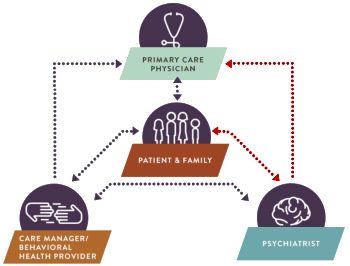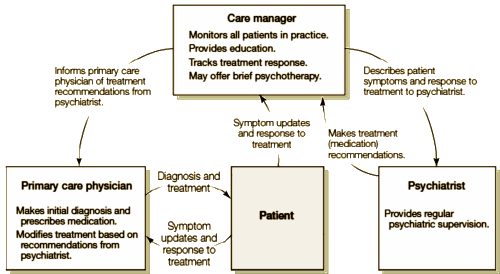I’ve tried to steer clear of the guild side of psychiatry in this blog and focus on the misinformation generated on the psychopharmacologic side of the world. But reading about this push for Integrative Care coming from the APA has sort of put it in my face. Unless I’m grossly misreading things, the APA is currently actively participating in removing the medical specialty of psychiatry from the clinical care of patients. Here’s the APA Infographic subtext again:
|
• Makes initial diagnosis and prescribes medications
• Modifies treatment based on patient preferences,needs, and psychiatrist recommendations
|
• Identifies goals, needs, and preferences for treatment
• Participates in regular screening
|
|
|
|
||
|
• Monitors all patients in practice
• Provides education
• Tracks treatment response
• May offer brief psychotherapy
• Assures patient engagement
|
• Provides team leadership
• Reviews caseload regularly
• Educates and consults
• Sees patients who are not making improvements
|
|
George Dawson of Real Psychiatry was onto Integrative Care earlier than most of us [see The Model of Psychiatric Care for the Future, Collaborative Care Model – Even Worse Than I Imagined], certainly before I was [see his recent comments here, here, and here]. In the second post […Even Worse Than I Imagined], he mentions a JAMA article with an earlier version of the Integrative Care model:
by Bridget M. Kuehn, MSJJAMA, June 19, 2013 309[23]:2425-2426.

As predicted in my original post, the psychiatrist here is so marginalized they are close to falling off the page. And let’s talk about what is really happening here. This is all about a patient coming in and being given a PHQ-9 depression screening inventory. For those of you not familiar with this instrument you can click on it here. It generally takes most patients anywhere from 1 – 3 minutes to check off the boxes. Conceivably that could lead to a diagnosis of depression in a few more minutes in the primary care clinic. At that point the patient enters the antidepressant algorithm and they are they are officially being treated. The care manager reports the PHQ-9 scores of those who do not improve to the "supervising" psychiatrist and gets a recommendation to modify treatment.This is the model that the APA has apparently signed off on and of course it is ideal for the Affordable Care Act. It is the ultimate in affordability. The psychiatrist doesn’t even see the patient – so in whatever grand billing scheme the ACA comes up with – they won’t even submit a billing statement. The government and the insurance industry have finally achieved what they could only come close to in the past – psychiatrists working for free. Of course we will probably have to endure a decade or so of rhetoric on cost effectiveness and efficiency, etc. before anyone will admit that. Keep in mind what the original government backed model for treating depression was over 20 years ago and you will end up shaking your head like I do every day. Quality has left the building.

This definitely is not a model for minimizing the prescription of psychiatric drugs.
Rather, the APA is going in the direction of urging more prescription for more people with the argument that mental illness is being underserved. As ever, the organization ignores the statistics showing psychiatric drugs are being overprescribed to millions of people.
Proposing a role for psychiatrists as technicians who do nothing but look at charts, the APA is backing away from serving the interests of its members, who presumably became doctors to treat humans. It also is doing nothing for patient safety, which has been its posture for at least 20 years anyway.
So whose interests does it serve? Why isn’t the membership up in arms about this?
We’ll see next week at the APA. I have no clue why…
The interest of the oligarchy is served.
Throughout much of its history with the exception of a few periods of intense activism the APA has essentially been an oligarchy. As is the case with most oligarchies it is more insulated than ever. The failed referendum on MOC was an obvious statement of that point. The members vote 80:20 against and are told they did not get the required number of votes, but the votes were greater than for any candidate.
This is a high point for oligarchies in American society. It probably will not be an inflection point. When the APA ignores the training, expertise, and interests of its members and throws its hat in with the PPACA and managed care cartel it is joining every state and federal government, state medical boards, the ABPN and the ABMS in opposing the interests of physicians. It seems like an obvious mistake. After all, it does not have specialty board leverage to force physicians to do what they want.
That is also why the APA is not a guild or a union. Guilds and unions are certainly corruptible, but at some point they need to do something to improve the conditions of the workers to justify their existence. The APA (and AMA for that matter) seems to have no similar compulsion. In my 30 years of practice it has been a continuous deterioration to the point that physicians are being overtly ripped off.
Yet you still pay dues and support them…
The APA serves the interests of those at the top very well. It’s a social club and meeting place for academics who want to pad their CV or their influence or their income. One of the people running for president is deeply involved in pushing MOC. He actually tried to contact me on LinkedIn for support. I told him exactly what I thought of APA in very clear terms, and that he should have read my CV in which I proudly highlight the fact that I am not a member of APA nor AMA.
Full disclosure: Many years ago, I worked for a state specialty medical association that was devoted to lobbying in the state legislature on behalf of its clinicians. (My job was to analyze studies for white paper counter-arguments. The usual weakness was subject selection, which is a major flaw in psychiatry research as well.)
Those of us on the staff worked incredibly hard to advocate policy for high standards in clinical practice, with the physicians as champions for patient safety. If the membership was not convinced we were working in its interests, they would stop paying dues and we’d all be out of a job.
I find the acquiescence of the APA membership incredible, but perhaps psychiatrists are so confused by all the flim-flam that’s come their way in the last 20 years, they don’t know where their best professional interests lie.
Given the APA president is a short-term empty suit with a flapping yapper, here’s the functionary who provides policy continuity http://alert.psychiatricnews.org/2013/05/saul-levin-md-will-be-next-apa-medical.html
“I find the acquiescence of the APA membership incredible, but perhaps psychiatrists are so confused by all the flim-flam that’s come their way in the last 20 years, they don’t know where their best professional interests lie.”
Five or six years ago, I went to the GPA [Georgia Psychiatric Association] meeting to be on a panel discussing a case presented by a resident. It was one of those very hard cases that trainees often end up with. Many people in the audience were old friends I hadn’t seen in years.”I remember those cases” they said in one way or another. “But now I spend my days medicating the walking wounded” said in many different ways. I had trained with or taught them all, and they seemed a little embarrassed, like I might chide them for their choices. On the way home, I found myself saying “They seemed resigned. Like they’d lost the ‘fire in the belly.'” There was one exception, a former resident who had chosen a military career. When we talked about his cases in Iraq, you could feel the passion he had for his work.
I don’t know if they “don’t know where their best professional interests lie” or not. It felt then and at other similar times as if they were just rolling with the punches. When I ask about practice, most proudly announce that they “still have some therapy cases,” as if I would be disappointed if they didn’t – since that’s what I had always taught. I didn’t feel disappointed in them. What I felt was we had not prepared them for the world they had to live in. But I don’t know how we would’ve done that if we had known. And for that matter, if that had been the task, I wouldn’t be the one doing it.
But I sure never felt like I was among the people that the critics rave about – greedy narcissists pumping people full of pills for profit…